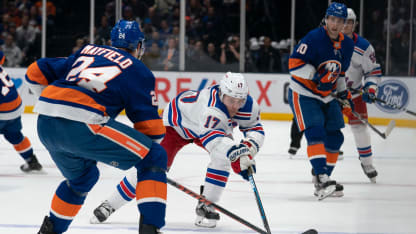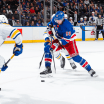Jesper Fast had a decision to make, although really there was only one choice.
The Rangers winger and three teammates had been hemmed in their zone by an Islanders power play for a full minute and a half, and after surviving one last goalmouth scramble, Marc Staal was able to pop the puck out to neutral ice, where the Islanders would have to chase it down and the four Ranger killers could, mercifully, reach the bench for a change.
Except that Staal's clear went right to the door of the visitors' penalty box, where at that moment Tony DeAngelo emerged to take the puck from the Islanders' Devon Toews, and go on the attack. Fast, observing this, abandoned his change and turned up-ice in a full sprint instead.
"It's amazing how much any energy you can find when you can take advantage of a possible 2-on-1," David Quinn said.
Rangers Are Killing It
Perfect on Long Island, PK Has Given Blueshirts a Big Boost in New Year

Fast proved a useful decoy when DeAngelo snapped a short-side wrister past Semyon Varlamov - a tiebreaking goal that, obviously, does not go into the books as a shorthanded score but which owed everything to the Rangers' penalty kill nonetheless. It was a pivotal moment in what became an emotional 3-2 Blueshirts win at Nassau Coliseum, a victory buoyed by a perfect 5-for-5 penalty kill before their top power-play unit scored a last-minute goal to win it.
It also was only the latest stout performance out of the Rangers' shorthanded corps: Since the calendar turned to 2020, the Lindy Ruff-guided unit has been the No. 2 penalty kill in the NHL, having killed 21 of 23 penalties - 91.3 percent, four-tenths of a percentage point behind the League-best Canadiens. One of the two goals they've surrendered was Brock Nelson's bat-in during garbage time of Monday's 6-2 Garden rout of the Isles - the only power-play goal the Rangers have allowed during their five-game winning streak on Broadway, which they will put on the line against the red-hot Columbus Blue Jackets on Sunday evening.
On Thursday night on Long Island, though, Quinn saw an instance of pure will, his players rising to the level of an emotional game in an electric building - not to mention a perfect nine shorthanded stops on a 38-save night from Alexandar Georgiev.
"The blocked shots, just gutting up when we needed to," the Head Coach said on Saturday. "Because you're out there for a minute and a half killing a penalty, you get tired, and you can really make bad decisions. But I thought we did a good job staying tight and not getting overextended, and obviously our goalie was big. I think it was a microcosm of the game in general."
"A lot of this is a mindset," Brady Skjei said. "If your guys on the ice are willing to take a big shot, block a puck at a big time, that's just how you have to get it done sometimes. We've definitely been playing with that emotion lately."
The Rangers' penalty kill stands now at 79.3 percent for the season, ranked 19th in the League, but it is well-trodden ground that the PK numbers have been weighed down by a couple of games in particular where everything snowballed badly. No one gets to pick and choose results, but against the NHL's top two power plays - Edmonton and Tampa Bay - the Blueshirts have been burned for nine goals on 18 man-advantages (50 percent) over four total games. Against the other 28 teams, the Rangers' PK is at 82.8 percent, which on its own is a top 10 number -- to go along with eight shorthanded goals, second in the League to Carolina's nine (Mika Zibanejad is the NHL co-leader with three of those).
If nothing else, the unbalance in those numbers changes the optics when the Rangers are taking stock of their man-down play.
"We have the right tools in here to put together a successful penalty kill, and I definitely think we've shown that this year," said Skjei, who led the Rangers on Thursday playing 5:16 shorthanded (Zibanejad played 5:15). "I think we've got good structure in place and we've done a good job, but especially in the last couple weeks. That last game, killing off a 4-on-3, and that one right earlier in the third, then the power-play goal at the end - all of it wins a game for us."
Fast, Staal, Brett Howden, and Ryan Lindgren were the four marooned Rangers killing that penalty early in the third period of a tie game, and once the gas tanks hit empty it became simple desperation and desire to finish the kill. Officially, on that shift alone, Georgiev made two saves, Fast blocked one shot and Lindgren blocked two, although he appeared to make a kick save on a third one, too.
"At a certain point you're just battling and doing whatever you possibly can to keep the puck out of the net," Lindgren said. "And the longer you're out there, the more you're trying to kind of sink back a little bit and just keep it tight. I know (Anthony) Beauvillier was teeing off a little bit on that one-timer side, so I knew I had to get out there and try to block some shots. But Quickie had some blocks, I think Howds had some, Staalsie -- everyone was pitching in. It's a key moment in the game, and that was a great job by the penalty kill in that moment."
"I thought we did a good job reading off each other," added Quinn. "When you're out there, not only do you need to gauge your energy, you've got to gauge your teammates' energy. So if you're going to go (pressure a puck), your teammates out there, those other three have to have the same type of energy to match your energy when you pressure.
"I thought we found a balance of keeping them on the outside, but not getting overextended."
The Rangers' penalty kill is 16-for-17 (94.1 percent) during their five-game Garden winning streak, which began on Dec. 22. They have two home games in three days before stepping into the All-Star break, Sunday against Columbus (23rd-ranked power play) and Tuesday in the mini-series finale against the Isles (21st). "It's been really good," Lindgren said, "and it's also really important that we keep it going."


















